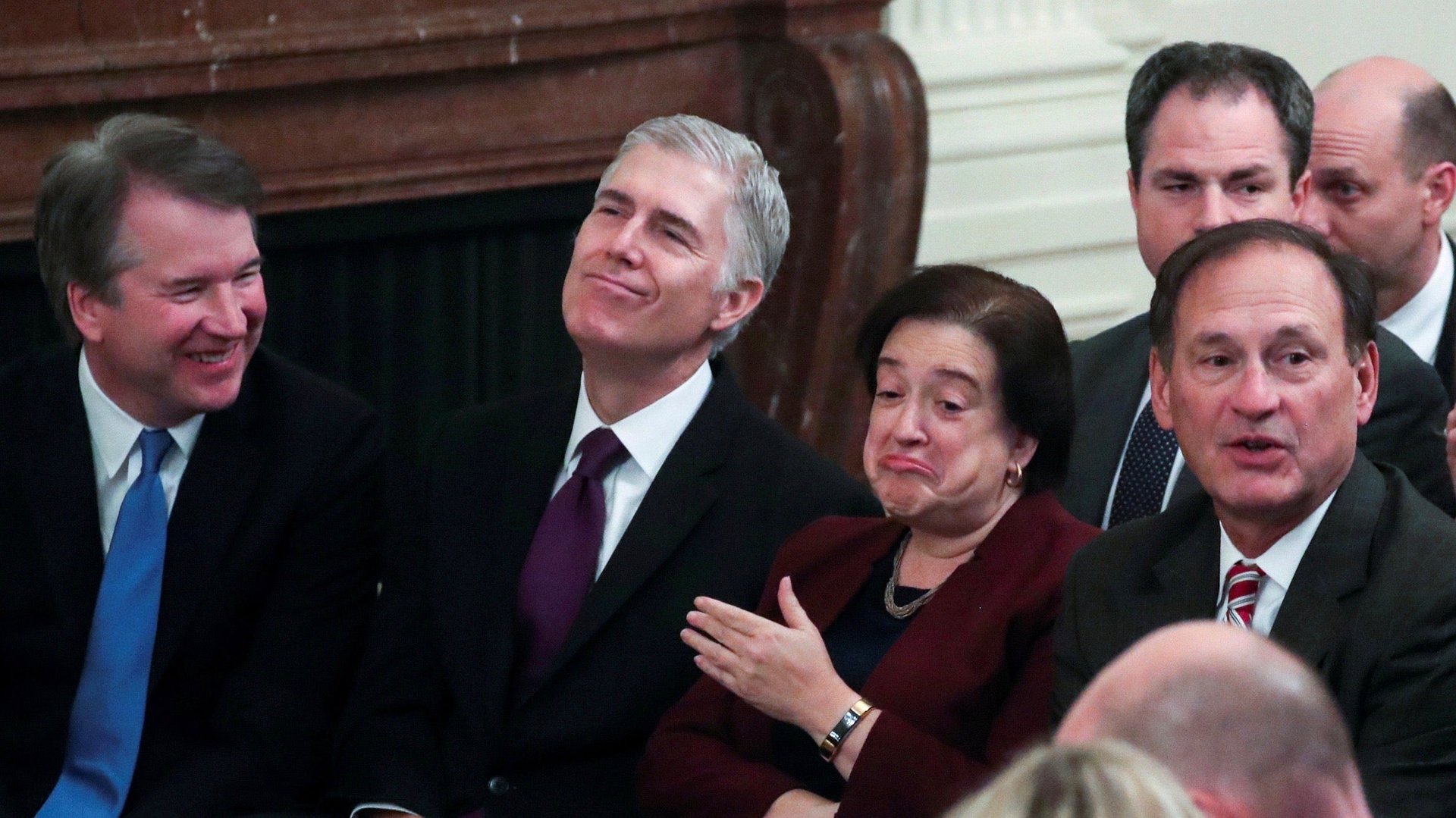An unseemly meeting at the US Supreme Court raises ethics questions
Just how friendly should US Supreme Court justices be with friends of the court, the amici who file briefs based on their interests in a case where they aren’t litigants?


Just how friendly should US Supreme Court justices be with friends of the court, the amici who file briefs based on their interests in a case where they aren’t litigants?
On Oct. 29, Brian S. Brown, president of the conservative advocacy group National Organization for Marriage (NOM), tweeted a photo of himself with justices Brett Kavanaugh and Samuel Alito and boasting about a “great day” at the US Supreme Court. The tweet raised alarm bells for court critics.
NOM regularly files amicus briefs with the court, as it already has this term in some of the most controversial cases before the justices. Brown’s organization, as a “friend of the court,” submitted a filing opposing a finding that Title VII, an anti-employment-discrimination statute, protects gay and transgender people.
The court is considering the issue in three cases and heard arguments on Oct. 8. Less than three weeks later, while justices were still mulling the matters, two of the bench’s conservatives had a friendly meeting with an activist who has made it abundantly clear how he feels they should rule.
While the justices might not necessarily be swayed by anything Brown said when they all hung out, and they probably didn’t discuss their upcoming decision, the mere fact of the meeting casts doubt on their impartiality. And the appearance of fairness, the sense that litigants have a fair chance in court, is key to public confidence in the legal system. That’s why US Code Section 455 provides that “[a]ny justice, judge, or magistrate judge of the United States shall disqualify himself in any proceeding in which his impartiality might reasonably be questioned.”
In response to the revelation of the meeting on social media, Fix the Court, a nonpartisan organization advocating for judicial transparency, sent a letter to the chief justice’s counsel asking that the court either withdraw NOM’s brief or explain why the justices may continue to sit on the cases given the standard in federal law. The organization’s executive director, Gabe Roth, told Quartz that as of Nov. 1 it had not received a response.
“A case isn’t finished until the opinion is out,” Roth noted. So, any meeting between a justice and an advocate who has expressed positions on a matter is problematic because it undermines public trust in the judge’s ability to be fair. He calls these engagements failures of a “basic ethics test” and is concerned about how commonly these failures occur. “These types of things keep happening and it shows a lack of awareness on the court’s part,” he said.
The problem is nonpartisan, Roth says, and calls into question the judgment of the most powerful judges in the land. Liberal and conservative justices alike are involved in these ethical lapses.
For example, a week before Alito and Kavanaugh had their unseemly meeting, liberal justice Elena Kagan spoke at at the University of Colorado Law School. Some of the university’s branches, although not that law school, have signed an amicus brief (pdf) in another extremely controversial matter before the court, supporting the continuation of the DACA program that defers immigration action for some children of undocumented immigrants who are students, serve in the military, or work for American businesses.
Roth believes that everyone, whatever their political party or ideological tendencies, should be concerned about these kinds of engagements by the justices. And he doesn’t think it’s too much to ask that members of the bench not interact with the people and institutions who’ve broadcast their views in amicus briefs while those cases are open, if only to maintain that precious appearance of neutrality.
Theoretically, the high court agrees, at least based on its 2009 ruling in Caperton v. AT Massey Coal. That case asked whether a state court judge must recuse themselves when one party to a matter has donated significantly to the jurist’s election. The justices concluded that even if a judge has no actual bias and “would do their very best to weigh the scales of justice equally between contending parties,” due process demands that the judge not decide the case for the purpose of maintaining that crucial appearance of impartiality that gives the public confidence in the justice system.
Notably, however, chief justice John Roberts dissented from that decision. He was joined by Alito. They felt that the majority expanded the standard of recusal improperly, which means that the public probably should not expect the justices to respond to the criticisms of their ethics anytime soon.
Clarification: This post has been corrected to reflect the fact that the specific school where Kagan spoke didn’t sign on to the DACA brief. The National Organization for Marriage goes by the acronym NOM and not NOMA as previously stated.